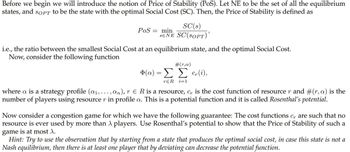Before we begin we will introduce the notion of Price of Stability (PoS). Let NE to be the set of all the equilibrium states, and SOPT to be the state with the optimal Social Cost (SC). Then, the Price of Stability is defined as SC(s) SENE SC(SOPT)' PoS min = i.e., the ratio between the smallest Social Cost at an equilibrium state, and the optimal Social Cost. Now, consider the following function #(r,a) Φ(α) = Σ Σ c(i), rER i=1 = where a is a strategy profile (a₁,..., an), r R is a resource, c, is the cost function of resource r and #(r, a) is the number of players using resource r in profile a. This is a potential function and it is called Rosenthal's potential. Now consider a congestion game for which we have the following guarantee: The cost functions c, are such that no resource is ever used by more than λ players. Use Rosenthal's potential to show that the Price of Stability of such a game is at most \. Hint: Try to use the observation that by starting from a state that produces the optimal social cost, in case this state is not a Nash equilibrium, then there is at least one player that by deviating can decrease the potential function.
Before we begin we will introduce the notion of Price of Stability (PoS). Let NE to be the set of all the equilibrium states, and SOPT to be the state with the optimal Social Cost (SC). Then, the Price of Stability is defined as SC(s) SENE SC(SOPT)' PoS min = i.e., the ratio between the smallest Social Cost at an equilibrium state, and the optimal Social Cost. Now, consider the following function #(r,a) Φ(α) = Σ Σ c(i), rER i=1 = where a is a strategy profile (a₁,..., an), r R is a resource, c, is the cost function of resource r and #(r, a) is the number of players using resource r in profile a. This is a potential function and it is called Rosenthal's potential. Now consider a congestion game for which we have the following guarantee: The cost functions c, are such that no resource is ever used by more than λ players. Use Rosenthal's potential to show that the Price of Stability of such a game is at most \. Hint: Try to use the observation that by starting from a state that produces the optimal social cost, in case this state is not a Nash equilibrium, then there is at least one player that by deviating can decrease the potential function.
Oh no! Our experts couldn't answer your question.
Don't worry! We won't leave you hanging. Plus, we're giving you back one question for the inconvenience.
Submit your question and receive a step-by-step explanation from our experts in as fast as 30 minutes.
You have no more questions left.
Message from our expert:
Our experts are unable to provide you with a solution at this time. Try rewording your question, and make sure to submit one question at a time. We've credited a question to your account.
Your Question:

Transcribed Image Text:Before we begin we will introduce the notion of Price of Stability (PoS). Let NE to be the set of all the equilibrium
states, and SOPT to be the state with the optimal Social Cost (SC). Then, the Price of Stability is defined as
SC(s)
SENE SC(SOPT)'
PoS min
=
i.e., the ratio between the smallest Social Cost at an equilibrium state, and the optimal Social Cost.
Now, consider the following function
#(r,a)
Φ(α) = Σ Σ c(i),
rER i=1
=
where a is a strategy profile (a₁,..., an), r R is a resource, c, is the cost function of resource r and #(r, a) is the
number of players using resource r in profile a. This is a potential function and it is called Rosenthal's potential.
Now consider a congestion game for which we have the following guarantee: The cost functions c, are such that no
resource is ever used by more than λ players. Use Rosenthal's potential to show that the Price of Stability of such a
game is at most \.
Hint: Try to use the observation that by starting from a state that produces the optimal social cost, in case this state is not a
Nash equilibrium, then there is at least one player that by deviating can decrease the potential function.
Knowledge Booster
Learn more about
Need a deep-dive on the concept behind this application? Look no further. Learn more about this topic, computer-science and related others by exploring similar questions and additional content below.Recommended textbooks for you

Operations Research : Applications and Algorithms
Computer Science
ISBN:
9780534380588
Author:
Wayne L. Winston
Publisher:
Brooks Cole

Operations Research : Applications and Algorithms
Computer Science
ISBN:
9780534380588
Author:
Wayne L. Winston
Publisher:
Brooks Cole
